|
|
|
Sort Order |
|
|
|
Items / Page
|
|
|
|
|
|
|
| Srl | Item |
| 1 |
ID:
073828
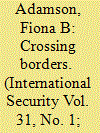

|
|
|
|
|
| Publication |
2006.
|
| Summary/Abstract |
International migration has moved to the top of the international security agenda, due in part to concerns that migration flows provide conduits for the spread of international terrorism. Although such concerns are not entirely unfounded, they must be placed within the broader context of the range of impacts-both positive and negative-that international migration flows have on states' core national security interests. Migration flows affect at least three dimensions of national security: state capacity and autonomy, the balance of power, and the nature of violent conflict. Overall, migration management presents a far greater security challenge to weak and failing states than to advanced postindustrial states. States that are able to formulate and implement migration policies that harness the power of international migration will be more secure, rather than less secure, in the new globalized security environment.
|
|
|
|
|
|
|
|
|
|
|
|
|
|
|
|
| 2 |
ID:
184309
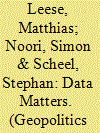

|
|
|
|
|
| Summary/Abstract |
Data matter more than ever in the regulation of borders and migration. An apt illustration of how movement is enabled or restricted by data collection and analytics was recently reported by Eyal Weizman, founding director of the London-based research agency Forensic Architecture that specialises in the production and analysis of evidence about human rights violations by state and corporate actors. Prior to a business trip to Miami where he was supposed to open Forensic Architecture’s first major exhibition in the US that, among other things, displayed investigations into a CIA drone strike in Pakistan and police killings of black US citizens, Weizmann was notified that his visa waiver request had been denied and that he would not be allowed to enter the United States.
|
|
|
|
|
|
|
|
|
|
|
|
|
|
|
|
| 3 |
ID:
106220


|
|
|
|
|
| Publication |
2011.
|
| Summary/Abstract |
International law defines refugees and their rights and the legal obligations of states that receive them. However, the actual formulation and implementation of asylum law are based on the politically and historically contingent constructions of the status of 'refugee' that are determined largely by nation states. This article analyses the legal-political construction of 'refugee' in the post-communist Czech Republic during and after its accession to the European Union. It examines the role of the state and the non-governmental sector and explains the gradual shift that took place towards treating asylum as a matter of migration management rather than a fundamental human right.
|
|
|
|
|
|
|
|
|
|
|
|
|
|
|
|
| 4 |
ID:
098427


|
|
|
|
|
| Publication |
2010.
|
| Summary/Abstract |
This article explains how the global governance of international migration has evolved as a policy issue on the international agenda over the past decade while noting that there is still no consensus on whether global governance is really required, what type of global governance would be appropriate, and how it should develop. The article reviews a series of policy options that have been proposed to fill the governance gap in international migration; namely, to create a new agency, to designate a lead agency, to bring the International Organization for Migration into the UN system, a coordination model, a leadership model, a World Trade Organization model, and an evolutionary model.
|
|
|
|
|
|
|
|
|
|
|
|
|
|
|
|
| 5 |
ID:
170411


|
|
|
|
|
| Summary/Abstract |
Developed and developing countries are increasingly cooperating on migration management, and human rights NGOs have harshly criticised these instruments for cooperation. This article asks how and to what extent parliaments are challenging policies for international cooperation on migration management. On the one hand parliaments have traditionally been described as ‘moral tribunes’ in international relations, due to their principled support for human rights. On the other hand, parliaments are increasingly operating in political systems marked by anti-immigrant sentiment and increased support for right-wing populist parties. How do parliaments navigate between these two poles when it comes to international cooperation on migration management? Based on examples from Australia, the EU and Israel, this article shows that the use of non-legally binding instruments for cooperation limits the formal role of parliaments, but also and more importantly that there is a lack of political will to scrutinise these instruments and hold executives to account (notwithstanding attempts by some members of parliament or some political groupings to challenge policies through informal means). The lack of political contestation implies that, as far as migration management is concerned, ‘politics stop at the water's edge’.
|
|
|
|
|
|
|
|
|
|
|
|
|
|
|
|
| 6 |
ID:
156753


|
|
|
|
|
| Summary/Abstract |
There has been an increasing focus on migration management by academics and policy makers, especially in relation to temporary and transitional forms of mobility. This paper considers the acceleration of Filipino migration to New Zealand in recent years, partly driven by changing policies allowing migrants to transition from student and work visas to permanent residence. It outlines the history of Filipino migration to New Zealand, the roles of the Philippines and New Zealand governments and intermediaries in migration management and the nature of student, temporary work and permanent residence migration. The transitional pathways used by Filipino migrants are analysed in relation to the influence of skills and educational characteristics in creating opportunities for some and vulnerability for others.
|
|
|
|
|
|
|
|
|
|
|
|
|
|
|
|
| 7 |
ID:
181173
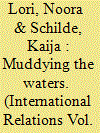

|
|
|
|
|
| Summary/Abstract |
Advanced liberal democratic states interdict migrants on the High Seas global commons. Why have liberal states engaged in this practice over the past four decades? Deterrence and humanitarian rescue explain part of this puzzle, but they are insufficient for understanding the patterns and justifications for migrant interdiction on the High Seas. Tension between states promoting international human rights and circumventing those obligations challenges expectations of liberal state behavior. International relations scholars must incorporate the global commons when explaining state behavior; ungoverned areas create exceptional zones for states to partially suspend their standard operating procedures to execute policies furthering their interests. We argue that liberal states use the regulatory gray zones of the High Seas to ‘muddy the waters’ in order to advance their security interests. States with the highest domestic refugee protections have incentives to circumvent their own obligations, which vary over time with changes to domestic asylum laws.
|
|
|
|
|
|
|
|
|
|
|
|
|
|
|
|
| 8 |
ID:
136301
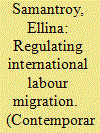

|
|
|
|
|
| Summary/Abstract |
Regulating international labour migration has been at the core of policy concerns in many countries of the world. The increasing movement of people from countries of origin to destination for employment has led to corresponding issues of trafficking of women, exploitation by recruitment agencies and violation of migrant rights. In this context, this present paper explores the problems of migrant workers exploited through recruitment agencies and the nature of exploitation and atrocities perpetrated on them. It also tries to understand the role of migration policies and migration management and regulation. Overall, the paper contextualizes international migration and the role played by recruitment agencies vis-à-vis Private Employment Agencies Convention 1997 (No. 181) adopted by the International Labour Organization.
|
|
|
|
|
|
|
|
|
|
|
|
|
|
|
|
| 9 |
ID:
162263


|
|
|
|
|
| Summary/Abstract |
This article analyses the search and rescue (SAR) activities carried out by three NGOs (MOAS, MSF and Sea-Watch) in the Central Mediterranean, and asks whether and in how far non-governmental SAR contributes to the repoliticization of the EU maritime border. The article first introduces the concept of depoliticization/repoliticization, as well as that of humanitarianization. Two sections summarize the development of the SAR regime and the governmentalization of international waters in the Strait of Sicily from the Cap Anamur case to 2016, and from late 2016 to recent days. Against this backdrop, the article analyses the different political positions taken by MOAS, MSF and Sea-Watch, their operational activities, as well as their cooperation and relations with the other actors involved in SAR. The three NGOs react differently to the contradictions that are typical of humanitarian non-state action. MOAS keeps a neutral political profile, whereas MSF and Sea-Watch regard their SAR activities as part of a political, not only humanitarian commitment. While the convergence of delocalized state sovereignty and humanitarian reason leaves hardly any room for manoeuvre, MSF and Sea-Watch try to question and contrast governmental policies and practices, as well as to turn international waters into a political stage from which they can make their voice heard and on which they can play the watchdog role.
|
|
|
|
|
|
|
|
|
|
|
|
|
|
|
|
| 10 |
ID:
086886
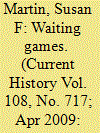

|
|
|
|
|
| Publication |
2009.
|
| Summary/Abstract |
Repeated efforts to achieve a new binational approach to immigration between the United States and Mexico have all ended in failure. So have recurring attempts to enact comprehensive US immigration reform that would include new temporary worker programs and legalization of unauthorized migrants, along with enhanced enforcement of immigration laws and border security.
|
|
|
|
|
|
|
|
|
|
|
|
|
|
|
|
|
|
|
|
|